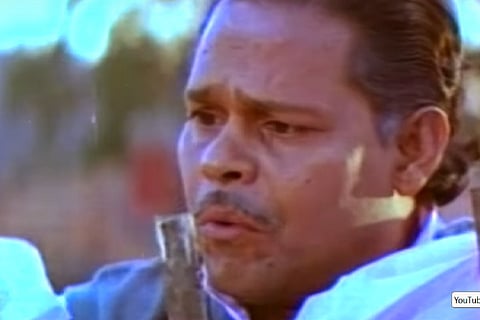

Non-natives of Kerala may feel perturbed about how or why Malayalis feel this way about their movie industry icons, especially when they pass away. The grief is personal and deep. It is as if we have lost a close relative, friend, or well-wisher. Nostalgia, as in the case of fans of most other film industries, is obviously a factor. But there is more to it. Some uniquely Malayali factors make us feel the loss so intimately.
Let us state and do away with the obvious one first. Malayalam film actors are great performers. The characters they portray and the way they do it are both often rooted in the smells, sights, and texture of Kerala’s soil, rain, streams, and trees. That makes the on-screen images so easy to identify with and relate to for Kerala’s natives. Even caricatures—from Sukumari’s Dick Ammayi in Boeing Boeing to the just departed Innocent’s Kittunni Ettan in Kilukkam—are grounded. You can then imagine what the more realistic characters do to us. Oduvil Unnikrishnan’s Govindan Aasaan in Valayam carves out our hearts with his shivering fingers every time his daughter’s body is brought home; Meena’s adorable Bhanumathi tickles and cajoles us with her “very Malayali mother” snark and warmth even the 23rd time we watch Melepparambil Aanveedu. How then can they not seep into our hearts?
The second reason is that, till recently, the biggest stars of Malayalam cinema lived relatively non-fussy lives, at least in public. Not for them the glitz of Bollywood and Tamil cinema. They were, and still mostly are, always within reach in their fans’ minds. At least till the 2000s, almost every other Malayali could claim to have met one or the other actor during a reserved-seat train journey, either within Kerala or to or from Chennai or Bengaluru. I once found Kunjan strolling around in Bengaluru’s KR Market, having just alighted a bus. We spent a few minutes chatting warmly in the city’s morning chill. Sometime in the early 1990s, the entire Sandesham gang—Jayaram, Mamukoya, TP Madhavan, Sankaradi, Sreenivasan, and others—could be seen freely loitering for almost two weeks around a banyan tree in Kozhikode’s East Hill locality where my school is located. They chatted up locals and shopkeepers during breaks as if they were locals themselves. My schoolmates will remember how cool Jayaram was with us kids, how funny Mamukoya was, or how grumpy Sankaradi was. Kozhikode Narayanan Nair was often seen waiting for a local bus ride or calling for an autorickshaw, like the hundreds of others around him. This is not to say that there aren’t any snooty ones in the fraternity. But even those weren’t different from our neighbourhood cranky uncle.
The third factor undergirding our attachment is related to the size of Kerala itself. At just around 40,000 square kilometres, it is a relatively small state. Most of us resident Malayalis are removed from each other by only a few degrees—or, to put it quite literally, kilometres. “Naatill evideya (where are you from in Kerala?),” that instinctive second line deployed by a non-resident Keralite greeting another, isn’t an empty one. It is predicated on a high chance of a connection emerging with some digging. It could be through a friend’s wife, a neighbour’s uncle, a teacher’s driver, a cousin’s father-in-law...you get the drift. It is, therefore, deducible that in the Malayali mind’s neighbourhood Kerala moviedom’s best aren’t far removed either. In any case, this is not about film stars alone. Our politicians, literary icons, classical artistes, intellectuals, and even real-life villains are all mostly just a street away.
The Malayali subconscious has always treated Kerala as one large extended neighbourhood. The film industry, too, was treated that way. At least till the Bhavana episode erupted in our faces. That day, something snapped. The perpetrators of that morbid crime had given us a reality check. We were rudely informed then that the Malayalam film industry and its movers and shakers had grown too big for their boots.
I may not feel the same way about that crime’s mastermind as I did about an Oduvil Unnikrishnan or a Kaviyoor Ponnamma. But I now pin my friendly neighbourly hopes on a new generation of Malayalam cine artistes. They are going back to our roots, and with a vengeance. The result is quite evident, too, isn’t it?
Lakshmi Harish is a UK-based freelance writer.